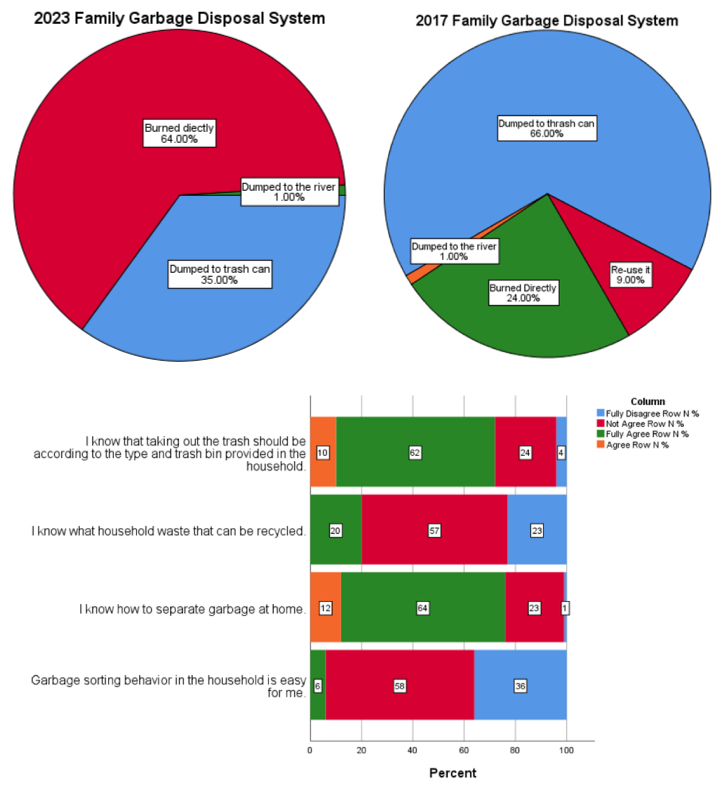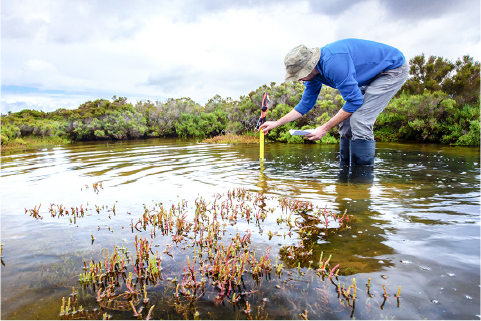研究者紹介
Researcher
地域イノベーション学研究科
地域イノベーション学専攻
WIRADIMADJA DAFI DINANSYAH

- 研究テーマResearch theme
- 廃棄物問題、ゴミの管理、リサイクル問題に関連する社会学的、経済的、行動的要因を調査します。
- 研究内容の概要Overview
- Environmental problems such as erosion, flooding, are mainly caused by human activities itself. Due to main environmental problems mainly came or originated from man, the solutions or prevention effort to repair the environment, must involve human factors in its planning. Waste can serve as an indication of human civilization's presence. Hence, it is imperative to implement effective waste management. In the absence of proper measures, a multitude of issues pertaining to waste management have the capacity to persist as a source of strain. According to research conducted by the United Nations Framework Convention on Climate Change (UNFCCC), trash is responsible for 6 percent of greenhouse gas emissions. In Indonesia in general, including in Bendungan Village, limited insight, lack of skills, poor health, and ethic are all internal factors that cause environmental problems. Furthermore, the problems in this village are garbage, the littering behaviour presents a variety of significant issues to the environment and also social problems.
The accumulation of litter is a significant contributor to contamination, which is an issue for the ecosystem. Plastics, domestic waste and a wide variety of other consumer goods that are frequently used accumulate in the environment, which results in a number of serious environmental consequences. Concerns about safety, the risk of fire, risks to human health, and indirect risks to health posed by roaches or rats that are drawn to garbage are some of the societal issues that are related with litter.
The objective of this study was to examine the social and behaviour aspects of the community in Bendungan Village, particularly their behaviour regarding the disposal of rubbish or littering, both the cause and effects. The research style employed in this study is a mixed methods approach, incorporating both quantitative and qualitative methodologies. The study focuses on the community of Bendungan Village, located in the Ciawi Subdistrict of Bogor.
Bendungan Village is located in the Bendungan Village, Bogor Regency, West Java, Indonesia. The object to be studied is the environment around the village, both the physical environment and the social environment. This location was chosen due to the massive land conversion that resulted in environmental degradation (deforestation, flooding and CRB / Citarum and Ciliwung River Basin's pollution). Bendungan Village is located in Ciawi Subdistrict, Bogor Regency, West Java, Indonesia. It is one part of Bogor City which has a land area of 132.9 Ha. It is located in coordinates 106.861984 East Longitude / -6.668112 South Latitude.
The study employed a mixed methods research design, incorporating both quantitative and qualitative approaches (Creswell, 2010). This study employs a quantitative methodology to analyse data pertaining to quantifiable aspects of the research object. These aspects include ecological factors, such as the proportion of people engaged in waste separation, the percentage of people using the garbage bank, littering, and waste reduction measures. Additionally, economic aspects, such as income levels and the number of small businesses, are also examined.
A qualitative methodology was employed to investigate various dimensions of the littering aspects, encompassing economy-social aspects (such as community formation, facilitation and reconciliation in the village, and mutual assistance), behavioural aspects (knowledge and biases) as well as spiritual aspect (including local wisdom, traditional littering practices, non-profit social organizations, and others).
Preliminary research findings indicate that the people in this village possess sufficient understanding regarding trash management and the consequences of littering. This information has been acquired from prior government initiatives that aimed to educate the population on waste and its proper treatment. Despite possessing the necessary knowledge, their behaviour continues to exhibit a significant level of littering. Individuals continue to incinerate or discard their waste, preliminary research suggesting that these individuals may exhibit confirmation biases. Several personal factors and psychological circumstances, such as confirmation bias, can influence ecologically harmful behaviour, even when individuals have sufficient knowledge. The availability of suitable waste disposal methods may not significantly influence their behaviour. The next subject under consideration concerns the existence of biased behaviour, which can have a substantial impact on individuals' decision-making processes, particularly in regards to activities such as garbage incineration. Although individuals may have clear cognitive knowledge and explicitly voice their thoughts on the matter, their judgments are often unintentionally influenced by their motivations, often without their own understanding. For example, those who deny the deterioration of their environment may not realize how their preference for keeping a tidy home or yard influences their assessment of the information they currently receive. The research findings indicate that a substantial number of individuals living in Bendungan Village participate in the practice of garbage dumping.
This study also discovered that a shift in individuals' conduct, transitioning from being passive observers to active participants, is crucial. While this the government programs have successfully educated individuals about waste-related behaviour, it successfully alters their behaviour shortly after the program, but it ultimately failed to alter their ingrained habits after six years of evaluation. Behavioural changes must be accompanied with activities that might cultivate motivation within the community waste management, while considering both economic and environmental incentives that are essential to solve the issues.
浸食や洪水などの環境問題は、主に人間の活動そのものによって引き起こされます。 主な環境問題は主に人間に起因するため、環境を修復するための解決策や予防の取り組みには、計画に人間の要素が関与する必要があります。 廃棄物は人類文明の存在を示すものとなりえます。 したがって、効果的な廃棄物管理を実施することが不可欠です。 適切な対策がなければ、廃棄物管理に関連する多くの問題がストレスの原因として存続する可能性があります。 国連気候変動枠組条約 (UNFCCC) が実施した調査によると、ゴミは温室効果ガス排出量の 6% を占めています。 ベンドゥンガン村を含むインドネシア一般では、限られた洞察力、スキルの欠如、健康状態の悪さ、倫理観のすべてが環境問題を引き起こす内部要因となっています。 さらに、この村の問題はゴミであり、ポイ捨て行為は環境に対してさまざまな重大な問題を引き起こし、また社会問題も引き起こしています。
ゴミの蓄積は汚染の大きな原因であり、生態系にとって問題となっています。 プラスチック、家庭廃棄物、および頻繁に使用されるその他のさまざまな消費財は環境中に蓄積され、その結果、多くの深刻な環境影響が生じます。 安全性、火災の危険性、人間の健康へのリスク、ゴミに引き寄せられるゴキブリやネズミによって引き起こされる健康への間接的なリスクなどは、ゴミに関連した社会問題の一部です。
この研究の目的は、ベンドゥンガン村のコミュニティの社会的および行動的側面、特にゴミの処理やポイ捨てに関する行動、原因と結果の両方を調査することでした。 この研究で採用された研究スタイルは、定量的方法論と定性的方法論の両方を組み込んだ混合方法アプローチです。 この研究は、ボゴールのチアウィ地区に位置するベンドゥンガン村のコミュニティに焦点を当てています。
ベンドゥンガン村は、インドネシア西ジャワ州ボゴールリージェンシーのベンドゥンガン村にあります。 研究対象となるのは、物理的環境と社会的環境の両方である村の周囲の環境です。 この場所は、環境悪化(森林破壊、洪水、CRB/チタルム川およびチリウン川流域の汚染)をもたらした大規模な土地転換のため選ばれました。 ベンドゥンガン村は、インドネシア西ジャワ州ボゴールリージェンシーのチアウィ地区にあります。 ボゴール市の一部であり、面積は132.9ヘクタールです。 座標は東経 106.861984 / 南緯 -6.668112 にあります。
この研究では、定量的アプローチと定性的アプローチの両方を組み込んだ混合法の研究デザインが採用されました(Creswell、2010)。 この研究では、定量的方法論を採用して、研究対象の定量化可能な側面に関連するデータを分析します。 これらの側面には、廃棄物の分別に従事する人の割合、ゴミ箱を利用する人の割合、ポイ捨て、廃棄物の削減対策などの環境要因が含まれます。 さらに、所得水準や中小企業の数などの経済的側面も調査されます。
ポイ捨て問題のさまざまな側面を調査するために、定性的手法が採用されました。これには、経済社会的側面(コミュニティ形成、村の円滑化と和解、相互扶助など)、行動面(知識と偏見)、精神的側面が含まれます( 地元の知恵、伝統的なポイ捨て行為、非営利社会団体などが含まれます)。
予備的な調査結果は、この村の人々がゴミの管理とポイ捨ての結果について十分な理解を持っていることを示しています。 この情報は、廃棄物とその適切な処理について国民を教育することを目的としたこれまでの政府の取り組みから得られたものです。 必要な知識を持っているにもかかわらず、彼らの行動は依然としてかなりのレベルのポイ捨てを示しています。 個人は廃棄物を焼却または廃棄し続けており、予備調査では、これらの個人が確証バイアスを示している可能性があることが示唆されています。 確証バイアスなどのいくつかの個人的要因や心理的状況は、たとえ個人が十分な知識を持っていたとしても、生態学的に有害な行動に影響を与える可能性があります。 適切な廃棄物処理方法が利用可能かどうかは、彼らの行動に大きな影響を与えることはないかもしれません。 次に検討されているテーマは、特にゴミ焼却などの活動に関して、個人の意思決定プロセスに大きな影響を与える可能性がある偏った行動の存在に関するものです。 個人は明確な認知的知識を持っており、その問題について自分の考えを明確に表明しているかもしれませんが、その判断は多くの場合、本人の理解なしに、意図せずに動機によって影響を受けます。 たとえば、環境の悪化を否定する人は、環境の悪化がどのように起こっているのか理解していない可能性があります.
家や庭をきれいに保ちたいという好みは、現在受け取っている情報の評価に影響を与えます。 調査結果は、ベンドゥンガン村に住むかなりの数の人々がゴミ捨ての行為に参加していることを示しています。
この研究ではまた、受動的な観察者から能動的な参加者へと個人の行動を変えることが重要であることも発見した。 この政府プログラムは、廃棄物関連の行動について個人を教育することに成功し、プログラム直後に人々の行動を変えることに成功しましたが、6年間の評価の後、最終的には彼らに根付いた習慣を変えることはできませんでした。 行動変容には、問題解決に不可欠な経済的インセンティブと環境的インセンティブの両方を考慮しながら、地域の廃棄物管理におけるモチベーションを高めるような活動が伴わなければなりません。
- 研究成果をどのように社会に役立てるか
(還元の構想)Giving back to society - Garbage is a prevalent issue encountered by nearly every nation worldwide. Waste is a persistent issue not only in impoverished nations, but also in rich nations. Indonesia's major urban areas generate tens of tons of rubbish on a daily basis, on average. Disposing of waste haphazardly is a common behavior, despite the presence of a nearby waste receptacle. The amount of litter on the roadside exceeds the amount of litter in the trash container. Consequently, haphazardly discarding trash will inevitably lead to significant and non-negligible losses.
I believe the solution of this problem is through social innovation, which is vital to the advancement of both people and the area as a whole. Additionally, through a variety of development and community empowerment initiatives that are more creative and attentive to the needs of the community, regional development of greater quality, efficacy, and efficiency can be implemented in both villages and cities. In this way, the initiatives can promote economic growth and productivity of community in a sustainable way to solve garbage and littering issues, and also in the end it will increase local independence and socioeconomic well-being.
Lastly, I believe that an interdisciplinary and multidisciplinary scientific approach is crucial to the development of innovation, in this case to solve various environmental issues, including garbage and littering. For innovation to be successfully applied--both social and technological--a social science approach encompassing economics, culture, law, and society at large is required. Human itself are the one who create garbage and create its own problems regarding garbage. Since humans are the ones who will ultimately use the innovation, I believe it is vital because innovation was first developed for the benefit of humanity. Social science, in my opinion, can provide a bridge between natural science and technology to enable the creation or effective use of innovations to solve both environmental and social issues.
ゴミは、世界中のほぼすべての国が直面する深刻な問題です。 廃棄物は、貧しい国だけでなく、豊かな国でも根深い問題です。 インドネシアの大都市部では、毎日平均して数十トンのゴミが排出されています。 近くにゴミ箱があるにもかかわらず、廃棄物を無計画に処分するのは一般的な行為です。 道端のゴミの量がゴミ箱内のゴミの量を上回っています。 したがって、ゴミを無計画に廃棄すると、無視できない重大な損失が必然的に発生します。
この問題の解決はソーシャルイノベーションによるものであり、それは人々と地域全体の発展にとって不可欠であると私は信じています。 さらに、より創造的でコミュニティのニーズに配慮したさまざまな開発およびコミュニティのエンパワーメントの取り組みを通じて、村と都市の両方でより質、有効性、効率性の高い地域開発を実施することができます。 このようにして、この取り組みは持続可能な方法で地域社会の経済成長と生産性を促進し、ゴミやポイ捨て問題を解決することができ、最終的には地域の自立と社会経済的幸福を高めることにもつながります。
最後に、イノベーションの発展、この場合はゴミやポイ捨てを含むさまざまな環境問題を解決するには、学際的かつ学際的な科学的アプローチが不可欠であると私は信じています。 社会面と技術面の両方でイノベーションをうまく適用するには、経済、文化、法律、そして社会全体を包括する社会科学的アプローチが必要です。 ゴミを生み出すのは人間自身であり、ゴミの問題を自ら作り出すのです。 イノベーションを最終的に利用するのは人間であり、イノベーションは最初に人類の利益のために開発されたものであるため、私はそれが重要であると信じています。 私の意見では、社会科学は自然科学と技術の間の架け橋となり、環境問題と社会問題の両方を解決するイノベーションの創出や効果的な利用を可能にします。




